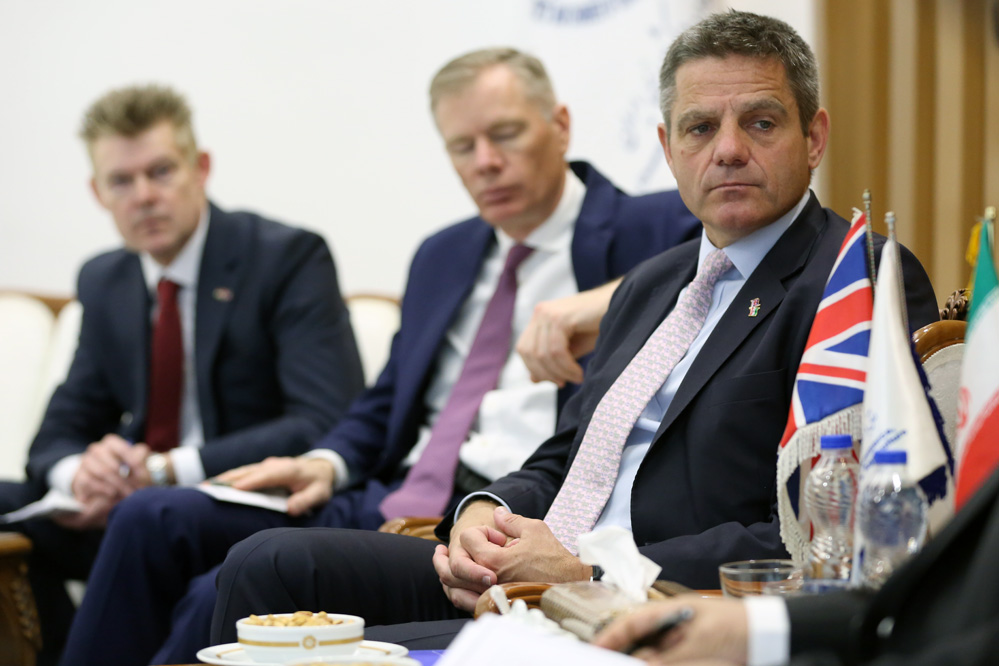Iran is the one country in the region that UK companies are very keen on doing business with, says the most senior British trade commissioner in the Middle East as the country is looking forward to expand its business ties in post-Brexit era with states around the world.
“I know from the discussions I have with UK companies that there is one country in this region that they are incredibly keen on doing business with and that is Iran,” Simon Penney, the British government's Trade Commissioner for the Middle East, Afghanistan and Pakistan told Hossein Selahvarzi, Vice President of Iran Chamber of Commerce, Industries, Mines and Agriculture (ICCIMA) at the chamber’s headquarters on Tuesday.
Penny, who was appointed by UK’s Secretary of State for International Trade, Liam Fox, last October as one of the trade commissioners of Department for International Trade (DIT), said part of his responsibilities is to “engage and inform the UK companies about doing business with Iran.”
Speaking to Iran Chamber Newsroom the senior UK trade commissioner said “the size of the Iranian economy and the country’s population as well as the demand for UK goods and services have helped establish very long working relationship between the British and Iranian companies”.
“All of the discussions I have with British firms about the Middle East focuses on where the opportunities lie,” Penney added, saying “I get asked more questions about how we can do more business with Iran. So it’s a country that is offering very very significant potentials and we are very keen where can support those aspirations.”
He added that he will be promoting investment and trade opportunities for British firms in Iran as well as the Iranian companies in the UK after the country eventually walks out of the European Union.

Simon Penney, the British government's Trade Commissioner for the Middle East, Afghanistan and Pakistan holding talks with Hossein Selahvarzi, Vice President of Iran Chamber of Commerce, Industries, Mines and Agriculture (ICCIMA). (Photo: Iran Chamber Newsroom, Mohammad Ali Mahdi)
The British government trade commissioner for the Middle East, Afghanistan and Pakistan emphasised that his country will enjoy considerable overseas investment opportunities as “the statistics talk for themselves when the IMF predicted that 90% of the economic growth will happen outside the EU over the next five years so there is significant potential for the UK outside of the EU.”
The senior British trade official in the Middle East, who was accompanied by British Ambassador to Iran Rob Macaire and Head of DIT in Iran Keith Wellings, highlighted that trade missions and fairs are the two channels through which he intends to promote trade and investment opportunities in Iran.
He stressed that securing financing is the most important element in expanding trade business with Iran after the US abandoned the 2015 international nuclear agreement with Iran.
The ICCIMA VP also reiterated that Iran’s financial channels with the world have been affected following the US withdrawal and the reimposition of sanctions on Iran.
The two officials also discussed how the European special financial channel INSTEX (Instrument in Support of Trade Exchange) can help facilitate trade between Europe and Iran. Selahvarzi noted that “banking ties, insurance and transit are the most important issues that need to be addressed within the framework of the new monetary mechanism”.
He went to call the creation of INSTEX as a big step by the E3 that came “late” but can be used as a basis for further business development between Iran and Europe. However, he cautioned that an imbalance in trade relatiosn with Europe could pose challenges for the channel, saying "Europe exported 740 million dollars worth of agri-foods to Iran in 2017 while the Iranian agricultural exports to Europe stood at 430 millions dollars."
Penney said the mechanism that was previously called Special Purpose Vehicle (SPV) “will provide an opportunity for UK firms to start doing more trade than we are doing today with Iran.”
However, he reiterated that “a lot work needs to be done, a lot of details still needs to be worked out and agreed on to make sure the mechanism is robust.”
The British trade representative for the region went on to confirm that “a working-level European delegation is set to visit Iran next week in a bid to hammer out details of INSTEX.”
Earlier, the Iranian Foreign Ministry announced that a high-level technical and economic delegations from the countries “that are responsible for INSTEX” will visit Iran “in near future” to study the details of the newly-established monetary mechanism.
Simon Penney also said “it is very important obviously that Iran passes the FATF because ultimately there will be banks involved in supporting INSTEX and those banks will be looking as global banks do to comply with global standards.”
The Iranian Expediency Council, tasked with resolving differences between the Iranian parliament and the legislative watchdog the Guardian Council, has postponed announcing its final decision to the next Persian Year (starting 21 March).